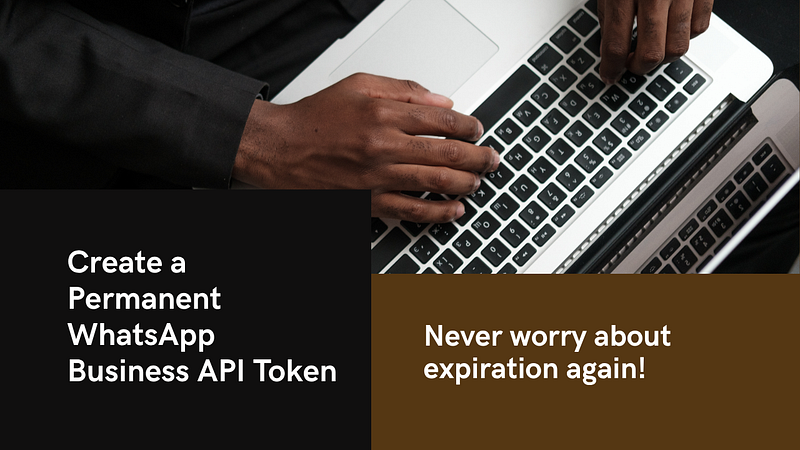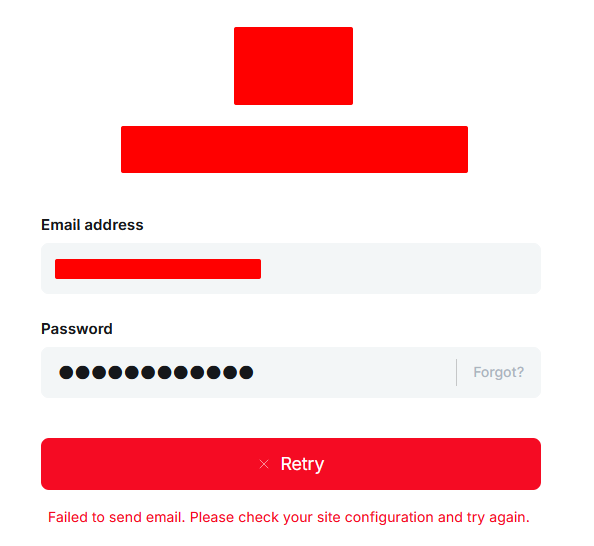How to Create a Permanent WhatsApp Business Cloud API Token That Never Expires
Introduction

Introduction
If you’ve been working with the WhatsApp Business Cloud API, you’ve probably experienced the frustration of dealing with temporary access tokens that expire every 24 hours. Constantly refreshing tokens can be a nightmare for production applications, leading to service interruptions and unnecessary complexity in your codebase.
The good news? There’s a solution: permanent access tokens using system users. These tokens never expire (unless manually revoked) and provide a robust foundation for your WhatsApp Business integrations.
In this comprehensive guide, I’ll walk you through the exact process of creating a permanent WhatsApp Business Cloud API token using Meta’s system user functionality.
Understanding the Problem with Temporary Tokens
Before diving into the solution, let’s understand why permanent tokens are crucial:
Limitations of Temporary Tokens:
24-hour expiration: Temporary tokens expire daily, requiring constant renewal
Service interruptions: Applications can break when tokens expire unexpectedly
Complex token management: Implementing automatic token refresh adds unnecessary complexity
Production headaches: Manual token renewal is not feasible for production systems
Benefits of Permanent Tokens:
No expiration: Tokens remain valid indefinitely
Simplified architecture: No need for token refresh mechanisms
Better reliability: Eliminates token-related service interruptions
Production-ready: Perfect for enterprise and production environments
Prerequisites
Before starting, ensure you have:
- A Meta for Developers account
- A Facebook Business Manager account
- A WhatsApp Business Account connected to your Business Manager
- Admin access to your Facebook Business Manager
- Your WhatsApp Business API app already created
Step-by-Step Implementation Guide
Step 1: Access Facebook Business Settings
Navigate to your Facebook Business Manager and access the system users section:
- Go to Facebook Business Settings
- In the left sidebar, click on “Users” → “System Users”
- Alternatively, use this direct link: System Users
Step 2: Create or Configure a System User
If you don’t have a system user yet, create one:
- Click “Add” button to create a new system user
- Enter a descriptive name (e.g., “WhatsApp API System User”)
- Critical: Assign the “Admin” role to the system user
- Click “Create System User”
Important Note: The system user must have admin privileges to generate permanent tokens. Employee-level access won’t work for this purpose.
Step 3: Assign Your WhatsApp App to the System User
This step connects your WhatsApp Business app to the system user:
- Select your newly created system user from the list
- Look for the “Assigned Assets” section
- Click “Add Assets” button
- Select “Apps” from the dropdown
- Find and select your WhatsApp Business app
- Choose “Full control” permission level
- Click “Save Changes”
Step 4: Generate the Permanent Access Token
Now comes the crucial part — generating the permanent token:
- In the system user details page, locate the “Generate New Token” button
- Click on it to open the token generation dialog
- Select your WhatsApp Business app from the dropdown
- Essential: Choose these specific permissions:
whatsapp_business_managementandwhatsapp_business_messaging - Click “Generate Token”
Step 5: Secure Your Token
This is a critical security step:
- A popup will display your permanent access token
- Copy the token immediately — you won’t see it again
- Store it securely in your password manager or secure notes
- Never commit this token to version control
- Use environment variables in your applications
Security Warning: This token provides full access to your WhatsApp Business account. Treat it like a master password and never share it publicly.
Step 6: Add System User to WhatsApp Business Account
Complete the setup by granting WhatsApp account access:
- Navigate to WhatsApp Business Accounts
- Select your WhatsApp Business account
- Go to the “People” section
- Click “Add People”
- Search for and select your system user
- Assign “Full control” permissions
- Click “Add”
Verifying Your Permanent Token
To ensure your token works correctly, test it with a simple API call:
curl -X GET \
"https://graph.facebook.com/v18.0/YOUR_PHONE_NUMBER_ID" \
-H "Authorization: Bearer YOUR_PERMANENT_TOKEN"Replace:
YOUR_PHONE_NUMBER_IDwith your actual phone number IDYOUR_PERMANENT_TOKENwith the token you just generated
A successful response confirms your permanent token is working correctly.
Best Practices for Token Management
Security Best Practices:
Environment Variables: Store tokens in environment variables, never in source code
Access Control: Limit who has access to the permanent token
Regular Audits: Periodically review system user permissions
Backup Tokens: Consider creating multiple system users for redundancy
Monitoring: Implement logging to monitor token usage
Implementation Best Practices:
Error Handling: Implement proper error handling for API calls
Rate Limiting: Respect WhatsApp’s API rate limits
Webhooks: Set up webhooks for real-time message handling
Documentation: Document your token configuration for team members
Common Troubleshooting Issues
Token Generation Fails
- Cause: System user doesn’t have admin privileges
- Solution: Ensure the system user has “Admin” role, not “Employee”
API Calls Return 401 Unauthorized
- Cause: Missing permissions or incorrect token
- Solution: Verify both
whatsapp_business_managementandwhatsapp_business_messagingpermissions are granted
Cannot Add System User to WhatsApp Account
- Cause: Insufficient permissions on the Business Manager
- Solution: Ensure you have admin access to the WhatsApp Business account
Token Suddenly Stops Working
- Cause: Token was accidentally revoked or system user was deleted
- Solution: Check system user status and regenerate token if necessary
Token Lifecycle Management
When Tokens Become Invalid:
Manual revocation through Business Manager
System user deletion
App deletion or major permission changes
Business Manager account issues
Monitoring Token Health:
Implement monitoring to detect token issues:
// Example: Simple token health check
const checkTokenHealth = async (token) => {
try {
const response = await fetch(
`https://graph.facebook.com/v18.0/me?access_token=${token}`
);
return response.ok;
} catch (error) {
console.error('Token health check failed:', error);
return false;
}
};Advanced Configuration Options
Multiple Environment Setup
For organizations running multiple environments (development, staging, production):
- Create separate system users for each environment
- Use descriptive naming conventions
- Implement environment-specific access controls
- Maintain separate token storage for each environment
Team Access Management
For teams requiring shared access:
- Create role-specific system users
- Implement proper access controls
- Use secure secret management solutions
- Establish token rotation policies
Security Considerations
Token Security Checklist:
✅ Token stored in secure environment variables
✅ No tokens committed to version control
✅ Access limited to necessary team members
✅ Regular security audits performed
✅ Monitoring and alerting implemented
✅ Backup access methods established
Compliance Requirements:
Depending on your industry, you may need to implement token encryption at rest, maintain audit logs of token usage, follow data retention policies, and implement access review processes.
Conclusion
Creating a permanent WhatsApp Business Cloud API token using system users is a game-changer for production applications. It eliminates the complexity of token management while providing a more reliable foundation for your WhatsApp integrations.
Key takeaways from this guide:
- System users with admin privileges are essential for permanent tokens
- Proper permissions (
whatsapp_business_managementandwhatsapp_business_messaging) are required - Security first — treat permanent tokens with the utmost care
- Monitoring and maintenance ensure long-term reliability
By following this comprehensive guide, you’ll have a robust, permanent token setup that will serve your WhatsApp Business API needs for years to come. No more midnight wake-up calls due to expired tokens!
Remember: with great power comes great responsibility. Permanent tokens are powerful tools that require careful handling and security consideration. Implement proper security measures and monitoring to ensure your WhatsApp Business API integration remains secure and reliable.
Have you successfully implemented permanent tokens for your WhatsApp Business API? Share your experience and any additional tips in the comments below!



Comments ()